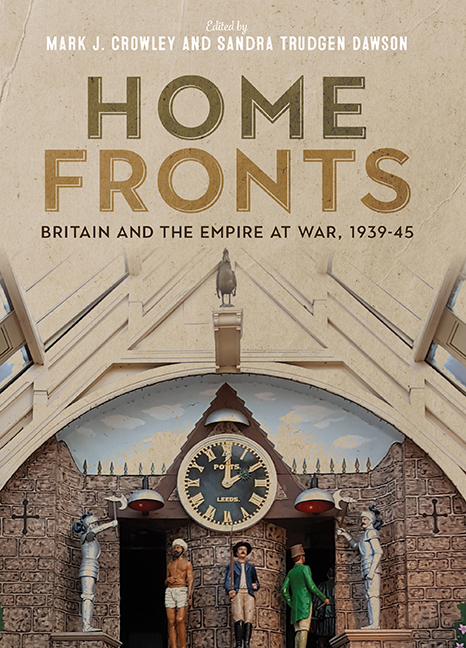Book contents
- Frontmatter
- Dedication
- Contents
- List of Illustrations
- List of Contributors
- Acknowledgements
- List of Abbreviations
- Introduction: Home Fronts and the Empire at War
- Part One Consumption on the Home Front
- 1 British Restaurants and the Gender Politics of the Wartime Midday Meal
- 2 A Nutritional Economy: The Calorie, Development and War in Mandate Palestine
- 3 Rubber Shortages on Britain's Home Front
- 4 Nation-Building and Nationalism in Bengali Children's Literature during the 1940s and 1950s
- Part Two The Militarized Home Front
- Part Three Technology, Danger and Waste on the Home Front
- Select Bibliography
- Index
1 - British Restaurants and the Gender Politics of the Wartime Midday Meal
from Part One - Consumption on the Home Front
Published online by Cambridge University Press: 30 August 2017
- Frontmatter
- Dedication
- Contents
- List of Illustrations
- List of Contributors
- Acknowledgements
- List of Abbreviations
- Introduction: Home Fronts and the Empire at War
- Part One Consumption on the Home Front
- 1 British Restaurants and the Gender Politics of the Wartime Midday Meal
- 2 A Nutritional Economy: The Calorie, Development and War in Mandate Palestine
- 3 Rubber Shortages on Britain's Home Front
- 4 Nation-Building and Nationalism in Bengali Children's Literature during the 1940s and 1950s
- Part Two The Militarized Home Front
- Part Three Technology, Danger and Waste on the Home Front
- Select Bibliography
- Index
Summary
IN 1940 Winston Churchill's coalition wartime government introduced a brand-new institution: the communal feeding centre. These not-for-profit government-run canteens provided nourishing, healthy and warm midday meals for the public at cost and off the ration. Rebranded ‘British Restaurants’ by Churchill himself, these institutions represent a striking new phenomenon: for the ‘first time in the history of [the United Kingdom]’ the government was providing nourishing and nutritious meals at below true market value to all of its citizens in a manner that could not be classed as ‘charity’. This provision of communal feeding facilities for ‘the general public under Government auspices’ was, according to the Ministry of Food [MOF], ‘an entirely new development since the War’. But, given that they served only 618,000 meals across the United Kingdom per day, and there were almost six times as many industrial canteens in operation during the Second World War, many historians have paid little attention to this innovation in government feeding. Instead, most have downplayed their significance, arguing that British Restaurants contributed only ‘marginally to wartime feeding’ and thus made only a ‘slight difference in relation to women's need to purchase food and then prepare it at home’. While acknowledging their limited contribution when measured in terms only of the number of meals put into hungry bellies, this chapter argues that, by loosening the ties that bound women to the kitchen and thus to the home, these institutions played an important cultural role in wartime Britain and beyond. Unlike rationing, which did not fundamentally alter domestic roles, the introduction of a state-run meals service opened up the possibility that the cooking of meals for oneself or one's family – an often-onerous duty – need no longer structure a woman's day and thus limit her economic, political and social choices. While domestic roles within the family were slow to change, debates over the British Restaurant were part of this process and exposed a variety of tensions around gender, food and the British family that circulated during the Second World War and in planning for reconstruction.
- Type
- Chapter
- Information
- Home Fronts - Britain and the Empire at War, 1939–45 , pp. 19 - 36Publisher: Boydell & BrewerPrint publication year: 2017



